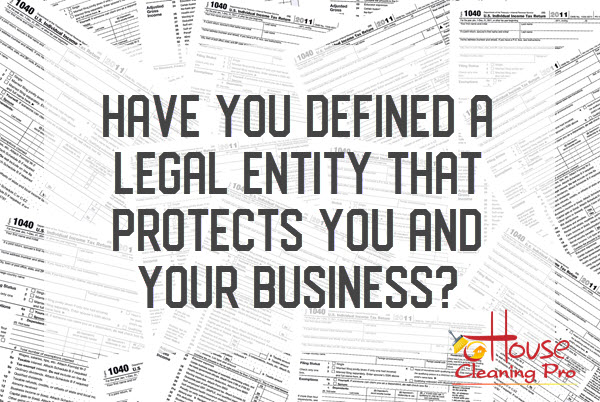There’s many ways to build a residential cleaning business, but the type of business entity you define can protect you or leave you exposed:
Clean houses for cash
Get a business license and a DBA
Sole Proprietorship
Automatically exists whenever you are engaging in business by and for yourself, without the protection of an LLC, Corporation or Limited Partnership.
- The ‘sole proprietorship cleaning business’ is a structure often employed by people new to the cleaning industry
- It exists by default, has easy tax rules
- However, a sole proprietorship cleaning business is open to liability in the event of a mishap like an accident or an injury
General Partnership
Once a sole proprietorship brings on its first partner, a general partnership is formed.
Limited Partnership
Not often used by small business owners. Frequently used in estate planning (so the kids can receive benefit from, but not manage, the assets of the Limited Partnership).
Limited Liability Company
Very often used by small businesses because it protects everyone; the members, the managers, and even you’re grandmother, if she decides to work for you.
Corporation
A corporation is completely separate from you, the business owner. It is a legal entity of its own and pay their own taxes at a corporate rate instead of a personal tax rate.
S-Corporation
Subject to the same filing requirements as a corporation, but has a tax status similar to a partnership.
These are only the considerations for filing your tax returns.
Other business issues to research
- And there are pros and cons associated with each. Do you know if you need a business license in your city? How do you find out?
- Are you personally liable for any problems when you own your own business? If something happens, can “they” take your house, your savings, your future?
- What happens if you start your business with a partner – your best friend – and things don’t work out?
- What happens if you break something in a home you are cleaning?
- How do you know the chemicals you purchased and use are safe?
- How do you know that products you make yourself are safe to use? After all, they’re considered green cleaning aren’t they?
These are only some of the reasons you should make sure the information you’re using to build your house cleaning business is the right information.
Who Can You Trust to Provide the Right Information?
Just because someone publishes information doesn’t make them an expert in residential cleaning. You’ll find professional journalists and writers posting articles on how to start a cleaning business, but they don’t have hands-on experience. Make sure you follow someone who has actually built the business and not just written about it.
And make sure you follow a “professional” and not just someone who cleans their own home. IT’S NOT THE SAME! You’ll never have a successful house cleaning business if you clean your client homes the same way you clean your own home. You’ll need professional speed cleaning procedures to produce quality work and keep you on schedule.
That’s why I’m the House Cleaning Pro:
- I’ve built a successful house cleaning business from the ground up
- I created a winning formula for success
- I have successfully sold my house cleaning business
- And it’s still being run today!
To get the answers to these questions and more business information, check out our comprehensive guide on starting a successful house cleaning business. We cover everything you need to know to start and run a thriving cleaning service.
blank line

5 replies on “Types of Business Entities for Your Residential Cleaning Business”
i love this
Thanks for sharing this informative post about the different types of business entities for a residential cleaning business. It’s important to carefully consider the type of entity that best suits your business needs, taking into account factors such as liability protection and tax implications. I appreciate that you’ve explained each type of entity in clear and concise language, making it easier for someone who is new to the world of entrepreneurship to understand the pros and cons of each option. One question I have is whether there are any specific legal requirements or regulations that vary depending on the type of entity you choose. Thanks again for sharing this valuable information!
I avoid giving out specific legal information. Instead I refer people to the legal experts.
Here’s an interesting page on the SBA site in the US:
https://www.sba.gov/business-guide/manage-your-business/stay-legally-compliant
Of course, you would review similar information where you are located.
This article is an absolute treasure. I’ve saved it for a future reference. Thank you for your valuable information!
I was wondering if you ever thought of changing the layout of your website? Its very well written; I love what youve got to say. But maybe you could a little more in the way of content so people could connect with it better. Youve got an awful lot of text for only having one or 2 pictures. Maybe you could space it out better?